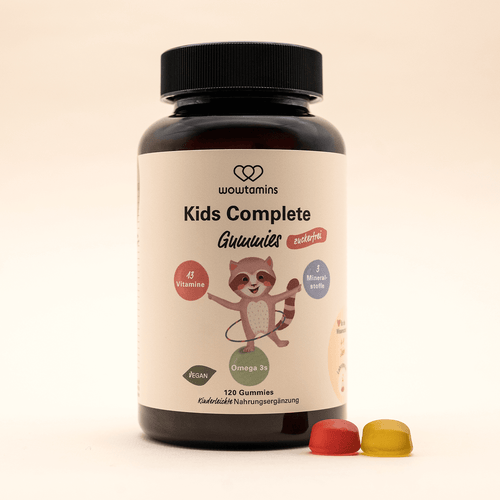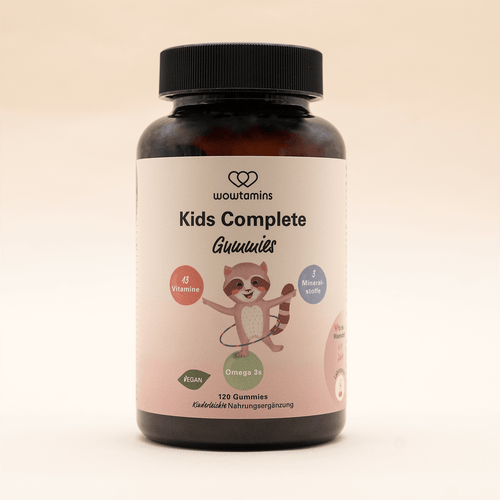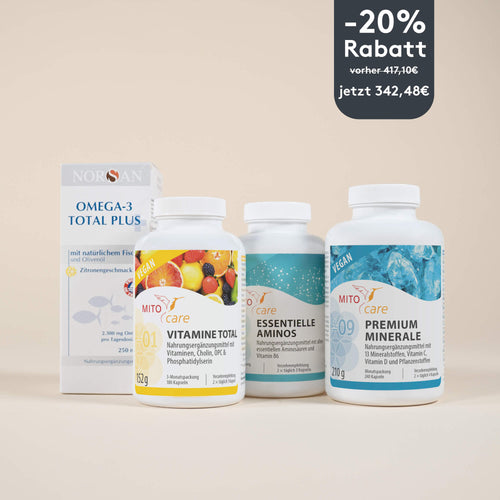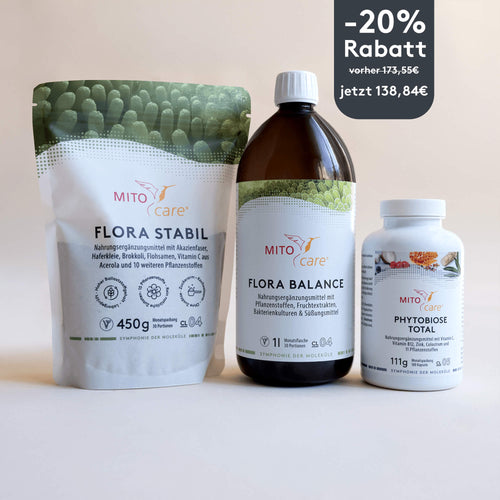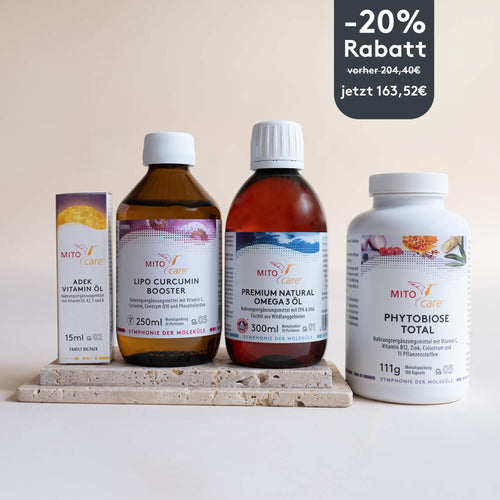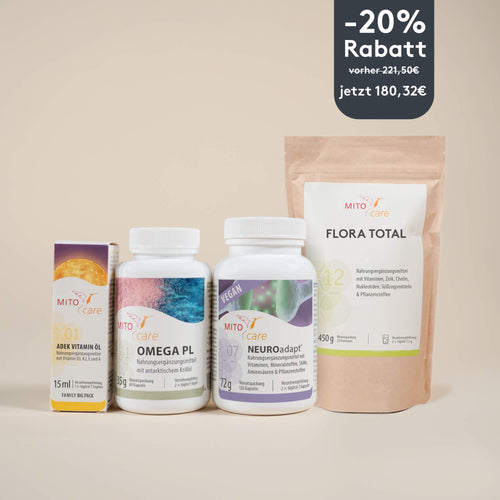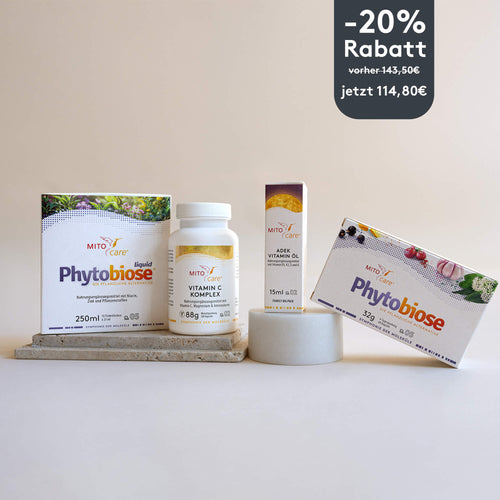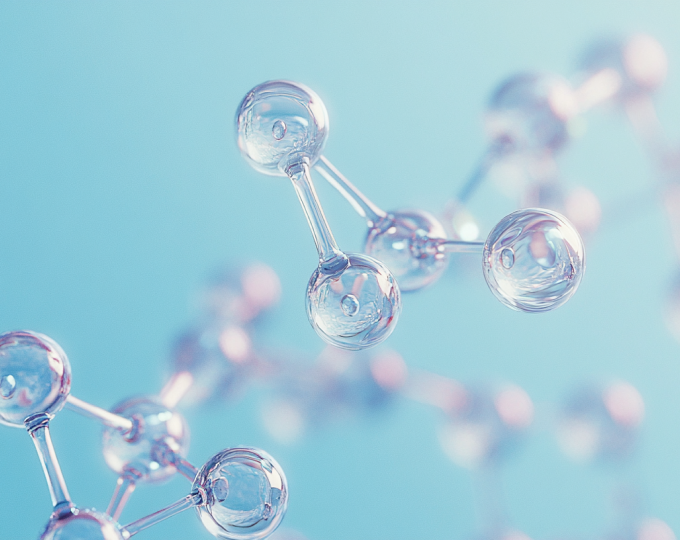Themen dieses Blogartikels:
Table of contents
- Vitamin Guide: Fat-soluble vs. Water-soluble Vitamins
- Which vitamins are important?
- Overview: Which vitamins does the body need?
- Which vitamins are absolutely essential?
- What are the 3 most important vitamins?
- When should you supplement with vitamins?
- Is it possible to overdose on vitamins?
- Conclusion
- Sources & Bibliography
Vitamin Guide: Fat-soluble vs. water-soluble vitamins
Vitamins are essential. This means your body cannot produce them itself. Therefore, you must obtain them from external sources through your diet. The 13 vitamins are divided into fat-soluble and water-soluble vitamins; four are fat-soluble and nine are water-soluble. The fat-soluble vitamins include vitamins A, D, E, and K2. All B vitamins and vitamin C are water-soluble.
Vitamin D is an exception, because your body can produce vitamin D itself - through the UV-B radiation of the sun.
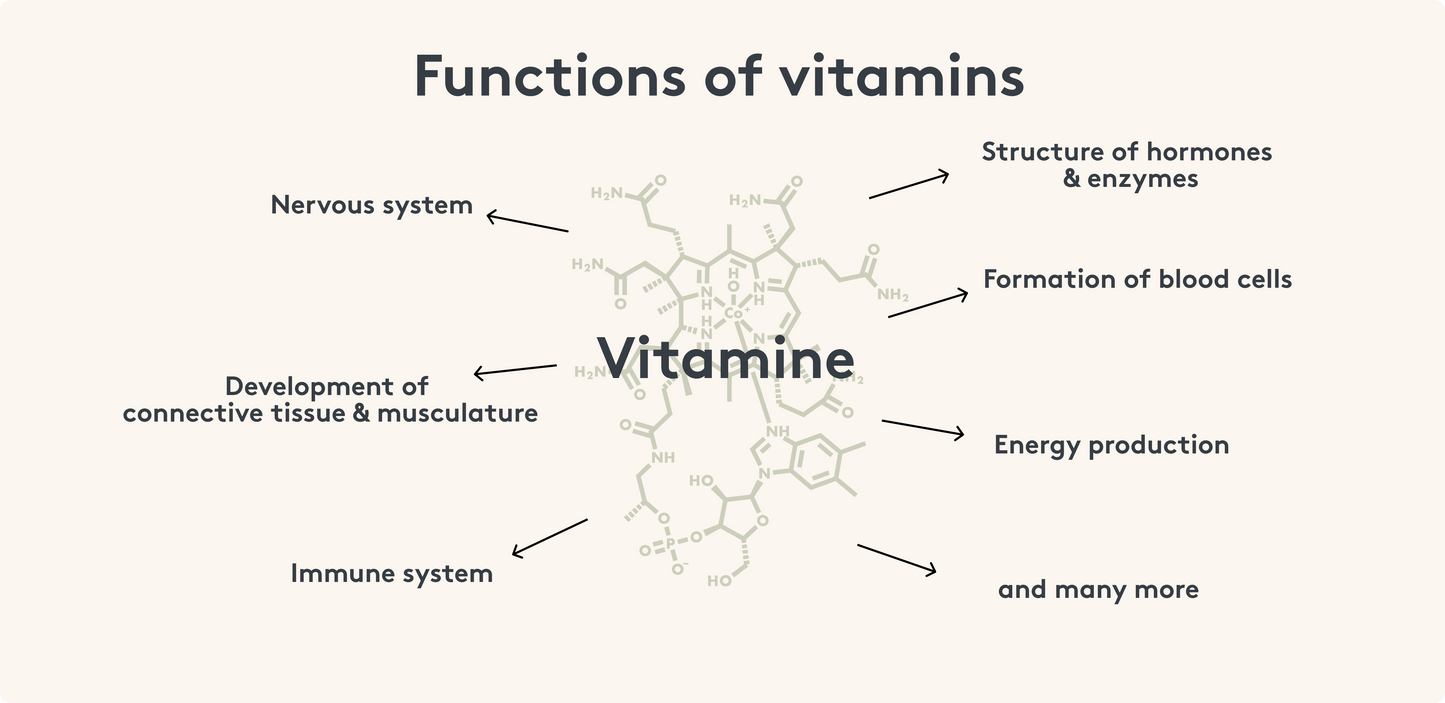

You should know this:
- Vitamins are essential for the body.
- The majority of vitamins are essential, meaning that they must be supplied from external sources.
- Vitamins are divided into fat-soluble and water-soluble vitamins.
- Vitamin D can be partially produced by the body through sun exposure.
Which vitamins are important?
Although vitamins do not provide energy, humans are neither capable of performance nor of life without them. All vitamins perform important tasks in the human body. They help in the utilization of food, are involved in the synthesis of hormones, enzymes and blood cells, protect against harmful substances and control numerous biochemical processes in the body.
Furthermore, they are involved in the extraction of energy from carbohydrates, fats and proteins. They are also involved in the building of muscles and connective tissue, as well as in the daily interplay of ligaments, tendons and muscles, and contribute to the function of the nervous system.


Vitamin E & Co: What are fat-soluble vitamins?
Vitamin A , Vitamin D , Vitamin E , and Vitamin K belong to the group of fat-soluble vitamins. These vitamins can be stored in the body's fatty tissue. The body can only properly absorb and utilize fat-soluble vitamins if it is provided with fat from food.
Vitamins A, D, E, and K2 are found in fats and oils, but also in many low-fat foods. Vitamin E is mainly found in vegetable oils.
Vitamin C & Co: What are water-soluble vitamins?
Water-soluble vitamins are those vitamins that, unlike fat-soluble vitamins, do not need to be ingested with fat and are not stored in fatty tissue. Unlike fat-soluble vitamins, they are hardly stored in the body and therefore must be continuously supplied through the diet.
Vitamin C and the B vitamins belong to the group of water-soluble vitamins. There is hardly any risk of an overdose with water-soluble vitamins, as they are simply excreted in the urine if the intake is too high.
Overview: Which vitamins does the body need?
This table provides a clear overview of vitamins, their known functions in the human body, natural sources, recommended daily intakes for adults, and possible deficiency symptoms. The information presented is based on a careful evaluation of scientific studies and recognized expert sources, such as the recommendations of health authorities and nutrition institutes.
Functions of Vitamins
This table* provides a clear overview of vitamins, their known functions in the human body, natural sources, recommended daily intakes for adults, and possible deficiency symptoms. The information presented is based on a careful evaluation of scientific studies and recognized expert sources, such as the recommendations of health authorities and nutrition institutes.
| Vitamin | Functions in the body | Natural sources | Recommended daily intake (adults) | Deficiency symptoms |
|---|---|---|---|---|
| Vitamin A (Retinol) |
Visual performance Structure of skin and mucous membranes Protection against DNA damage Blood formation Protein and fat metabolism Immune system Development of the embryo |
Liver, eggs, sausages, fish, dairy products Carrots, pumpkin, bell peppers, tomatoes, spinach, broccoli, apricots |
700–850 µg¹ |
Night blindness, visual disturbances Hair loss, dry skin Susceptibility to infection, fatigue Growth disorders, infertility |
| Vitamin B1 (Thiamine) |
Energy metabolism Nervous system Glucose and amino acid metabolism |
Whole grain products, pork, nuts, seeds, legumes | 1.0–1.3 mg² |
Fatigue, loss of appetite Weak concentration Depression, reduced performance |
| Vitamin B2 (Riboflavin) |
Energy metabolism Skin, mucous membranes, eyesight Protection against oxidative stress |
Dairy products, eggs, soy, fish, whole grains, nuts, mushrooms, broccoli, spinach | 1.0–1.4 mg³ |
Skin cracks, photosensitivity Anemia |
| Vitamin B3 (Niacin) |
Energy metabolism Nervous system Psyche Skin and mucous membrane health |
Nuts, seafood, whole grains, meat, milk, eggs, legumes, dates, mushrooms | 11–16 mg⁴ |
Inflammation of the skin and mucous membranes Weakness, mental disorders |
| Vitamin B5 (Pantothenic acid) |
Energy metabolism Hormone production Formation of neurotransmitters Mental performance |
Yeast, egg yolk, whole grains, liver, dairy products, fish, nuts, legumes | 5 mg⁵ |
Fatigue, muscle aches Hormonal disorders, concentration problems |
| Vitamin B6 (Pyridoxine) |
Protein, glucose, and energy metabolism Blood formation Hormonal balance Psyche and Immune System |
Offal, fatty fish, whole grains, nuts, seeds, bananas, potatoes | 1.4–1.6 mg⁶ |
Sleep disorders, anemia Muscle twitching, developmental disorders |
| Vitamin B7 (Biotin) |
Health of skin, hair, and nails Energy metabolism Nervous system |
Offal, egg yolk, oatmeal, peanuts, spinach, mushrooms, lentils | 40 µg⁷ |
Hair loss, skin problems Loss of appetite, muscle pain |
| Vitamin B9 (Folic acid) |
Cell regeneration Blood formation Psyche, nervous system Fetal development |
Leafy greens, liver, whole grains, eggs, legumes, tomatoes, potatoes | 300 µg⁸ |
Birth defects, premature births Mental health problems |
| Vitamin B12 (Cobalamin) |
Formation of red blood cells Cell division Nervous system, psyche Energy metabolism |
Meat, fish, eggs, dairy products, offal | 4.0 µg⁹ |
Fatigue, anemia Memory and concentration problems Tingling in the extremities |
| Vitamin C (Ascorbic acid) |
Connective tissue, collagen formation Immune system, iron absorption Cell protection, hormone production |
Sea buckthorn, citrus fruits, rose hips, bell peppers, cabbage, strawberries, potatoes | 95–110 mg¹⁰ |
Bleeding gums, fatigue Joint inflammation, susceptibility to infection |
| Vitamin D (Calciferol) |
Bones and teeth Calcium balance Immune and nervous system Cell division |
Oily fish, avocado, seaweed, mushrooms | 20 µg¹¹ |
Osteoporosis, rickets Muscle weakness, sleep disorders Depression, infections |
| Vitamin E (Tocopherol) |
Cell protection Fat metabolism Protection against oxidative stress |
Nuts, seeds, oils, peppers, eggs, whole grain products | 8 mg¹² |
Lack of concentration Dry skin, fatigue Arteriosclerosis |
| Vitamin K (K1/K2) |
Blood clotting Bone health Support for Vitamin D |
Spinach, leafy greens, cabbage, legumes, rapeseed oil, poultry | 60–80 µg¹³ |
Bleeding tendency Disorders of calcium metabolism |
*Note on the overview of vitamins and their functions
Please note that the information provided does not constitute individual health or healing promises and is not intended for self-diagnosis or treatment of illnesses. For personal health questions or suspected deficiencies, we always recommend consulting qualified medical professionals.
Which vitamins are absolutely essential?
As mentioned above, your body needs all vitamins to stay healthy and perform well. They are essential nutrients that your body, with a few exceptions, cannot produce itself. Fortunately, in this country, sufficient supply of these vital vitamins is usually easily possible through a balanced, varied diet.
As the German Nutrition Society (DGE) reports, vitamin deficiencies and resulting illnesses are extremely rare in Germany. Most Germans are therefore adequately supplied with vitamins.¹⁴ However, there are exceptions.
What are the three most important vitamins?
While all vitamins perform important functions in the body, there are some that you should pay particular attention to. Because with certain vitamins, despite the generally good nutritional situation in Germany, deficiencies can occur in certain cases.
Vitamin D (Calciferol)
As a study by the Robert Koch Institute (RKI) revealed, 30.2% of adults in Germany have insufficient vitamin D levels.¹⁵ The Federal Institute for Risk Assessment (BfR) even assumes that 60% of German citizens do not reach the desirable blood concentration of vitamin D.¹⁶
The reason for this: Many people spend too little time outdoors. If the skin is not exposed to enough sunlight, the body cannot produce enough vitamin D. This also explains the seasonal fluctuations in vitamin D supply – it is usually worse in winter. As a countermeasure, the experts from the RKI recommend exposing the face, hands and arms to the sun two to three times a week from spring to autumn, uncovered and without sunscreen. Sunburn should of course be avoided at all costs.¹⁷
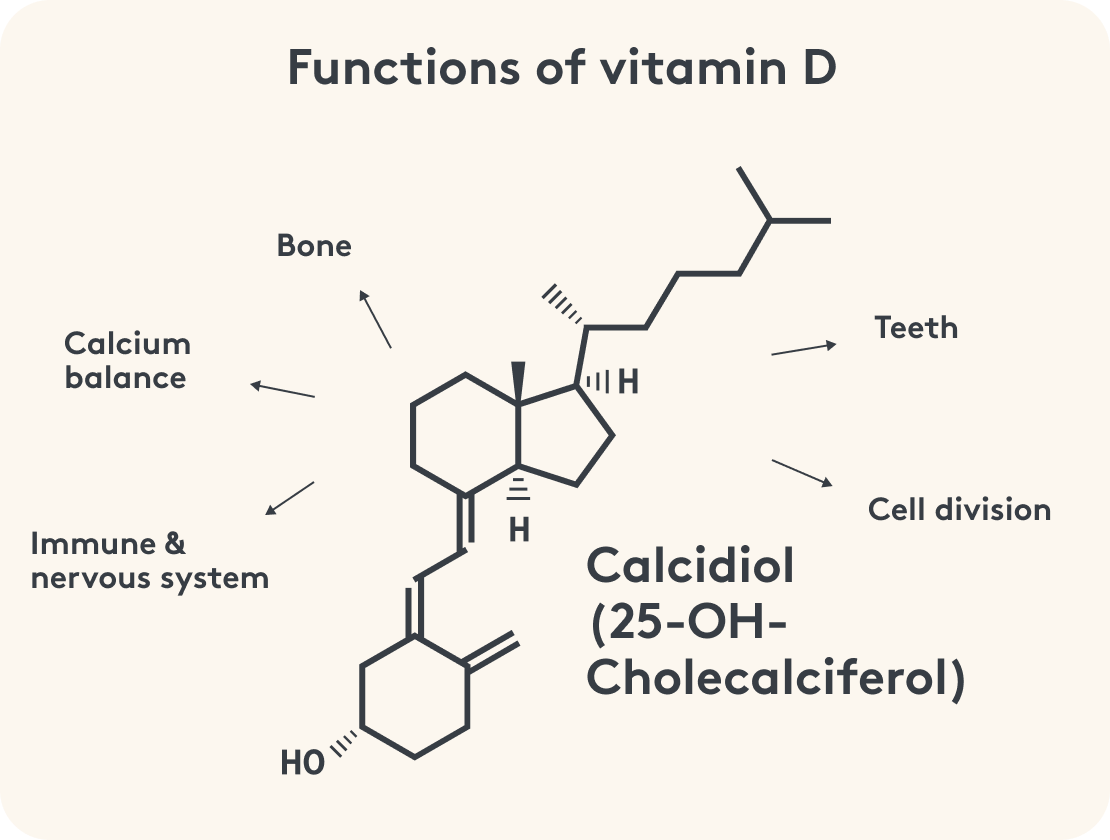

Vitamin B9 (Folic acid)
A large portion of the German population does not reach the recommended daily dose of vitamin B9 . This is shown by the "National Consumption Study II" of the Max Rubner Institute. Accordingly, 79% of men and 86% of women fall below the recommendation for daily folic acid intake.¹⁸
One reason for this is that folic acid is very sensitive to light and heat. During storage of folic acid-containing foods, as well as during cooking, frying, and keeping food warm, this vitamin is often destroyed.¹⁹
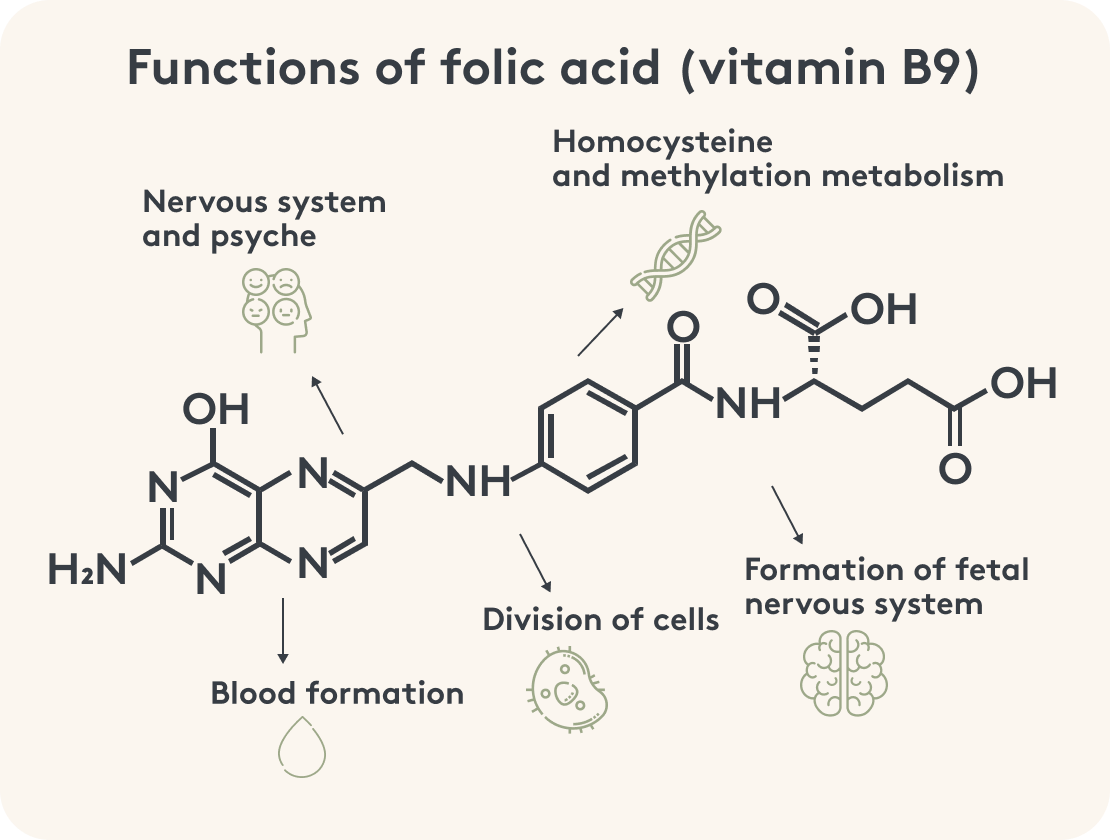

Advertisement
- All 8 essential B vitamins
- With biotin, niacin, thiamine, vitamin B6 & vitamin B12
- With the most valued bioactive vitamin B12 forms (methylcobalamin & adenosylcobalamin)
- With OPC from grape seed extract
- Vegan & free from lactose & gluten
- No fillers or additives
- Developed with doctors & experts

Vitamin B12 (Cobalamin)
Since vitamin B12 is only found in relevant quantities in foods of animal origin, vegans in particular must ensure an adequate supply. The BfR therefore recommends that everyone who avoids animal products for health or ethical reasons take vitamin B12 supplements and have their blood values checked regularly by a doctor.²⁰
When should you take vitamins in the form of dietary supplements?
Certain groups are at increased risk of developing vitamin deficiencies. Tip: If you are unsure about your diet and nutrient intake, consult your doctor. They can determine through a blood test whether your body is lacking certain vitamins or minerals.
Vitamins for Vegans
Apart from the already mentionedvitamin B12 , vegans should generally ensure an adequate supply of B vitamins. While vitamin B12 is the only vitamin that occurs only in animal products and therefore should definitely be supplemented in a plant-based diet, vitamin B2 is also primarily found in animal foods, such as milk and dairy products, so deficiencies can also occur here.²¹
Advertisement
- All 13 water- and fat-soluble vitamins
- For your daily routine & optimal care
- Valuable bioactive vitamins for your well-being.
- Free from Gluten & Lactose
- Vegan & vegetarian
- Supplemented with choline & grape seed extract with OPC
- Without fillers or excipients
- Developed with doctors & experts

Vitamins for athletes
Those who want to achieve peak performance in endurance or strength sports must ensure a good vitamin supply. Because athletes have an increased need for nutrients. In addition to amino acids and minerals, physically active people especially need sufficient B vitamins, vitamin C, and vitamin D to maintain energy metabolism, muscle function, and performance.
Vitamins for Pregnant and Breastfeeding Women
The nutrient requirements of pregnant and breastfeeding women are increased – after all, their bodies supply the child. Vitamin B9 (folic acid) is particularly important in the first weeks of pregnancy, as this vitamin is involved in cell division and contributes to the healthy development of the baby. Even if you are trying to conceive, you should ensure an adequate supply of folic acid. Other important vitamins for pregnancy include vitamin A , vitamin B6 ,vitamin C , and vitamin D.
Vitamins for Learners
B vitamins are crucial for concentration and a good memory. For example, vitamins B1, B6, B9, and B12 are involved in the regeneration of nerve cells and the transmission of signals in the brain. Vitamin B5 is also important, as it contributes to normal mental performance. The need for these vitamins may increase during periods of high (study) stress.²³
Vitamins for Older People
Nutritional needs can change with age. For example, some seniors have a reduced appetite and therefore absorb too few vitamins overall through their diet. Others develop chronic diseases that can hinder nutrient absorption in the body. Furthermore, the skin's ability to produce vitamin D using sunlight decreases with age.²⁴
Is it possible to overdose on vitamins?
The good news first: It is unlikely to consume too many vitamins through food. The situation is different with vitamins taken in the form of dietary supplements. There is a risk of overdose, especially with the fat-soluble vitamins A, K, D, and E. Unlike water-soluble vitamins, they are not simply excreted through the kidneys and urine – but stored in the tissues. Therefore, exceeding the recommended maximum amounts can have serious health consequences.
An overdose of vitamin D, for example, can lead to nausea, loss of appetite, and abdominal cramps. In the worst case, severe kidney damage and cardiac arrhythmias, even death, can result.²⁵ However, too much vitamin A can also have negative effects, such as on bone stability or, in pregnant women, on the health of the unborn child.²⁶
Vitamin Guide: Which vitamins should not be taken together?
First of all, the following applies: There are no limits to a vitamin-rich diet. No harmful interactions between vitamins are known, so you can combine natural foods to your heart's content.²⁷
If you want to take nutritional supplements, you may wonder what you need to consider when combining micronutrients: Which vitamins don't mix well? Here, caution is especially advised when taking folic acid: It should not be taken with zinc, as it prevents its absorption.²⁸
Conclusion: No more myths
Many people fear that due to the intensification of agriculture, fruits and vegetables today may contain fewer vitamins than before – but that is not true.²⁹ As current studies show, the best and easiest way to ensure optimal vitamin supply is a balanced diet. Nevertheless, there may be situations in which taking a supplement can be useful – for example, with a vegan lifestyle, if you are trying to conceive, or during pregnancy. But athletes and older people can also benefit from nutritional supplements. If in doubt, you should seek advice from a doctor or nutritionist beforehand.
This article is based on carefully researched sources:
Sources & Bibliography
- dge.de/science/reference-values/vitamin-a/
- dge.de/science/reference-values/thiamine/
- dge.de/science/reference-values/riboflavin/
- dge.de/science/reference-values/niacin/
- dge.de/science/reference-values/pantothenic-acid/
- dge.de/science/reference-values/vitamin-b6/
- dge.de/science/reference-values/biotin/
- dge.de/science/reference-values/folate/
- dge.de/science/reference-values/vitamin-b12/
- dge.de/science/reference-values/vitamin-c/
- dge.de/science/reference-values/vitamin-d/
- dge.de/science/reference-values/vitamin-e/
- dge.de/science/reference-values/vitamin-k/
- dge.de/press/news/pressarchive/germany-is-not-a-vitamin-deficiency-country/
- edoc.rki.de/handle/176904/2492
- bfr.bund.de/cm/343/selected-questions-and-answers-about-vitamin-d.pdf
- edoc.rki.de/handle/176904/2492
- bmleh.de/SharedDocs/Downloads/DE/_Ernaehrung/NVS_ErgebnisberichtTeil2.pdf?__blob=publicationFile&v=2
- msdmanuals.com/de/profi/ernährungsbedingte-störungen/vitaminmangel-abhängigkeit-und-intoxikation/folsäuremangel#Therapie_v44324602_de
- bfr.bund.de/assets/_temp_/Vitamin_B12_%E2%80%93_Pay_particular_attention_to_adequate_supply_with_plant-based_nutrition.pdf
- verbraucherzentrale.de/en/knowledge/food/dietary-supplements/vegan-nutrition-which-dietary-supplements-are-meaningful-13323
- netdoktor.de/pregnancy/vitamins/
- flexikon.doccheck.com/en/Pantothenic_acid
- verbraucherzentrale.de/wissen/lebensmittel/ernaehrung-fuer-senioren/fit-im-alter-brauche-ich-eine-nahrungsergaenzung-17725
- rki.de/SharedDocs/FAQs/EN/Vitamin_D/Vitamin_D_FAQ-List.html
- msdmanuals.com/de/home/nutrition-disorders/vitamins/vitamin-a-excess#Symptoms_v45106091_de
- augsburger-allgemeine.de/health/which-vitamins-should-not-be-taken-together-23-9-25-102046681
- pharmaceutical-journal.de/pharm1-03-2004/
- rosenfluh.ch/media/ernaehrungsmedizin/2004/02/Were-Fruits-Really-More-Nutritious-in-the-Past.pdf












